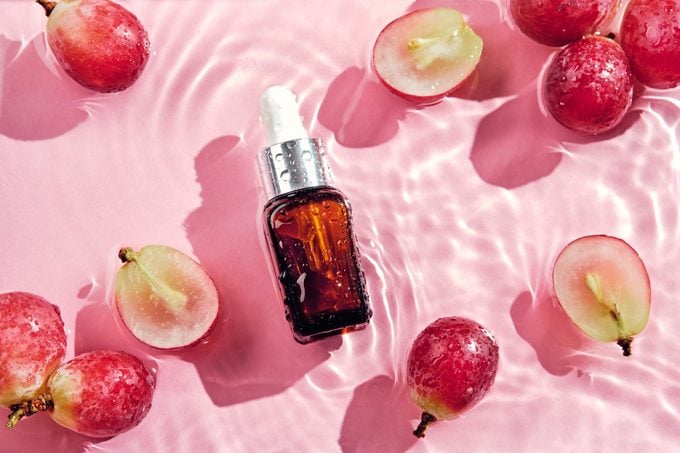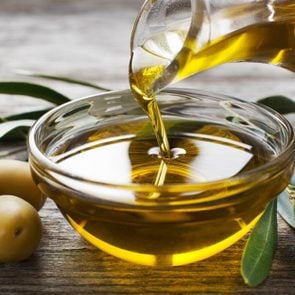Why Grapeseed Oil Is a Hair and Skin Care Ingredient Worth Trying
Updated: Aug. 19, 2021
If you're a fan of cooking with grapeseed oil due to its high smoke point or nutrition, know that it has benefits for your skin and hair too.
Grapeseed oil 101
Plenty of oils are touted as a way to smooth and soften skin and hair, from coconut to jojoba to argan oil.
One you may not have considered—or think of only as a kitchen ingredient—is grapeseed oil.
Sure it has a high smoke point, a property that makes it a great way to fry food, but can it really help your skin?
Here’s what you should know about grapeseed oil benefits, uses, and more.
What is grapeseed oil?
Grapeseed oil is made from the seeds of grapes that are left over after wine is made. The oil is extracted using either solvents or a cold-press technique.
Traces of solvents, such as hexane, are in some oils like grapeseed oil.
Cold-pressed grapeseed oil does not use chemical solvents, like hexane, during processing. So it’s a better choice as it’s unclear how trace amounts in oils may impact health.
While grapeseed oil can be used to cook and prepare foods, it’s also an ingredient found in hair and skin products, and is touted for its antioxidant content.
Grapeseed oil nutrition
While grapeseed oil doesn’t contain carbohydrates or protein (because oils are fats), it does contain a decent amount of antioxidants and heart-healthy fats, which may help keep your cholesterol levels down.
“Grapeseed oil also contains a significant amount of vitamin E, an antioxidant and powerful nutrient that aids in promoting anti-inflammatory processes within the body,” according to Gabrielle Mancella,an Orlando, Florida-based registered dietitian nutritionist.
The standard serving size of one tablespoon of grapeseed oil contains the following nutrients:
- Fat: 13.6 g (17.4 percent daily value)
- Sodium: 0 mg
- Carbohydrates: 0 g
- Fiber: 0 g
- Sugar: 0 g
- Protein: 0 g
- Calcium: 0 mg
- Iron: 0 mg
- Potassium: 0 mg
- Magnesium: 0 mg
- Vitamin E: 3.9 mg (26 percent daily value)
- Saturated fat; 1.3 g (6.5 percent daily value)
- Polyunsaturated fat: 9.5 g
- Monounsaturated fat: 2.2 g
- Zinc: 0 mg
Is grapeseed oil healthy?
“Grapeseed oil is one of my favorite oils to recommend for heart-healthy cooking,” says Amy Gorin, a registered dietitian and owner of Plant-Based Eats in Stamford, Connecticut.
“You get [about] 2 grams of monounsaturated fat and [nearly] 10 grams of polyunsaturated fat, which are heart-healthy fats, in one tablespoon,” she says.
“These are both heart-healthy fats, and you get very little saturated fat.”
These healthy fats, also known as omega-6 fatty acids, are also associated with reducing your risk of heart disease, in addition to helping to lower cholesterol, per the American Heart Association.
Grapeseed oil is also rich in phenolic compounds, and it also contains vitamin E and phytosterols, according to research in Nutrition and Metabolic Insights, Gorin says.

Grapeseed oil benefits and uses
Even though you’ll see it listed on beauty product labels, you’ll find grapeseed oil in its original form on grocery store food shelves.
One key perk of grapeseed oil is that you can use it in most culinary dishes without adding any overpowering flavor, Mancella says.
“[Grapeseed oil] has a very high smoke point, meaning you can use this in dressings (cold temperature cooking), as well as frying, or baking,” she says.
Gorin agrees, noting that the grapeseed oil smoke point is 420 degrees Fahrenheit, making it an all-purpose cooking option.
“I like it in a grilled corn salad or a vegetarian chopped salad,” she says.
Grapeseed oil is an alternative to olive oil or avocado oil for cooking or frying.
Grapeseed oil for hair
Grapeseed oil has been used extensively in cosmeceuticals, which are products with both cosmetic and medical effects that are meant to benefit both skin health and beauty, according to Patricia Farris, MD, a board-certified dermatologist at Sanova Dermatology in Metairie, Louisiana.
It can help alleviate dryness or dandruff, while promoting softness and shine, whether it’s from applying a tablespoon directly to the hair or scalp, or using shampoos and conditioners that contain it.
“Grapeseed oil contains fatty acids, vitamin E and phenolic antioxidants,” says Dr. Farris. “It can help hydrate hair, add shine, minimize breakage and fight frizz. The phenolics help reduce inflammation of the scalp and protect hair from UV damage.”
Grapeseed oil for skin
With so many products touting grapeseed oil as a main ingredient, you probably think it’s a safe bet that it provides benefits to your skin and body.
And you wouldn’t be far off—the antioxidants found in grapeseed oil have been found to promote skin softness and elasticity.
“[Research has shown] that, because of their chemical composition, oils like grapeseed oil may help with barrier repair, skin hydration, wound healing, and also act as antioxidants and anti-inflammatories,” Dr. Farris says.
Studies have also found that antioxidants in grapeseed oil can help with other skin conditions.
One example is proanthocyanidin, which can help to even out your skin tone, according to Biomedicine & Pharmacotherapy.
And research in Pharmacognosy Review also found that grape seeds had an antioxidant effect as potent as vitamin E’s.
Taking grapeseed oil orally is another option that may benefit the skin.
One small study in Phytotherapy Research that included 12 Japanese women found an improvement in melasma (also called chloasma, or the “mask of pregnancy”), a type of hyperpigmentation, after taking a proanthocyanidin-rich grape seed extract.
Does grapeseed oil clog pores?
If you experience acne, oily or combination skin, chances are you’re wary about applying oils to your skin.
While there isn’t research showing whether grapeseed oil contributes to clogged pores, Dr. Farris believes it’s generally a safe ingredient to promote healthy skin.
However, you may want to proceed with caution when it comes to applying the oil in its natural state to your skin.
“It’s always possible that you can develop a contact allergy when they are applied directly on the face, so it’s probably safer to use them in skin care products where they are formulated with other ingredients to minimize irritation,” she says.
Cautions and risks
There aren’t many risks or side effects of using or consuming grapeseed oil. Those who are allergic to grapes, however, should avoid it.
As with other skin products, do a patch test first to make sure you have a good reaction before applying it to the face.
The bottom line
Although more research is necessary, grapeseed oil appears to do more good than harm when it comes to using it as part of your beauty routine, in addition to being a healthy cooking staple. So don’t hesitate to look for it the next time you hit the grocery or drugstore.
“[Using grapeseed oil] is an extremely cost-effective way to include higher nutrient foods without breaking the bank,” Mancella says.



